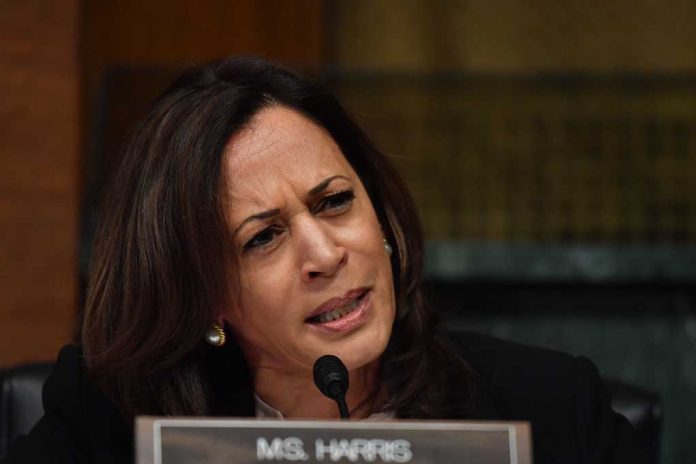
Vice President Kamala Harris’s tax reform plan faces scrutiny as critics question her grasp of economic fundamentals and the potential impact on the nation’s finances.
At a Glance
- Harris proposes raising corporate tax rate from 21% to 28% and individual top rate to 39.6%
- Plan aims to expand child tax credit and introduce $25,000 credit for first-time homebuyers
- Wharton Budget Model projects $1.2 to $2.0 trillion deficit increase over 10 years
- Critics question Harris’s understanding of her own tax reform initiatives
- Proposal estimated to increase tax revenue by $4.1 trillion from 2025 to 2034
Harris’s Tax Plan: A Balancing Act
Vice President Kamala Harris has unveiled a comprehensive tax reform plan that aims to address economic disparities and bolster middle-class finances. The proposal, which both builds on and diverges from the Biden administration’s policies, includes significant changes to corporate and individual taxation. While promising benefits for lower and middle-income Americans, the plan has ignited debate over its potential impact on the economy and federal deficits.
At the heart of Harris’s plan is a proposed increase in the corporate tax rate from 21% to 28%, coupled with a rise in the corporate alternative minimum tax from 15% to 21%. For individuals, the top income tax rate would climb to 39.6% for high earners, with capital gains taxed at 28% for incomes over $1 million. These measures are designed to generate substantial revenue to fund various initiatives aimed at supporting middle and working-class families.
Kamala Harris Tax Policy Ideas: Details and Analysishttps://t.co/IA6IvR3Y4Q
— Tax Foundation (@TaxFoundation) September 18, 2024
Middle-Class Focus and Economic Implications
Harris’s plan places a strong emphasis on middle-class support, proposing an expansion of the child tax credit and introducing a $25,000 tax credit for first-time homebuyers. Additionally, a controversial proposal to end taxes on tips for service workers could cost $118 billion over 10 years, according to estimates.
“My plan will make our tax code more fair, while also prioritizing investments and innovation,” Ms. Harris said on Wednesday. “So let us be clear: Billionaires and big corporations must pay their fair share in tax.”
However, the economic impact of these proposals has raised concerns among analysts. The Wharton Budget Model projects that the plan could increase deficits by $1.2 trillion to $2.0 trillion over 10 years, with GDP potentially falling by 1.3% by 2034. This projection has fueled debate about the long-term sustainability of Harris’s economic vision.
Income Redistribution and Political Positioning
The tax plan is expected to redistribute income from high earners to low earners, with the bottom 60% of earners projected to see increased after-tax income, while the top 5% may face decreased income. This redistribution aligns with Harris’s stated goal of making the tax code fairer and ensuring that “billionaires and big corporations pay their fair share.”
📊Analysis of Kamala Harris’s tax policy ideas:
We estimate the tax changes in Harris’s tax proposals would reduce long-run GDP by 2 percent, wages by 1.2 percent, and employment by about 786,000 FTE jobs.https://t.co/y6v7in62Cz pic.twitter.com/1AYOgsertX
— Tax Foundation (@TaxFoundation) September 30, 2024
Politically, Harris aims to differentiate herself from both Republican rivals and President Biden, projecting a more moderate image while maintaining populist elements. This balancing act is evident in her approach to corporate taxation and her emphasis on middle-class benefits.
Criticism and Concerns
Despite Harris’s efforts to present a comprehensive economic plan, critics have raised questions about her understanding of the tax reform initiatives she’s proposing. Recent missteps during a podcast appearance have fueled speculation about her grasp of fundamental tax concepts, such as deductions and start-up funds. These lapses have led some to question Harris’s capacity to handle intricate economic matters and her credibility as a leader proficient in economic decision-making.
“As president, I will take on the high costs that matter most to most Americans. … And I will work to pass the first ever federal ban on price gouging on food.” – Harris
As the debate over Harris’s tax reform plan continues, its impact on the 2024 presidential race remains to be seen. With significant economic implications and political stakes, the Vice President’s ability to convincingly articulate and defend her proposals will be crucial in gaining public and legislative support for her vision of tax reform.
Sources:
- Tax Policy Becomes a Fault Line for Harris
- FACT FOCUS: A look at Harris’ economic agenda
- Kamala Harris Tax Plan Ideas: Details and Analysis
- The 2024 Harris Campaign Policy Proposals: Budgetary, Economic and Distributional Effects
- What would a Kamala Harris presidency mean for tax policy?














